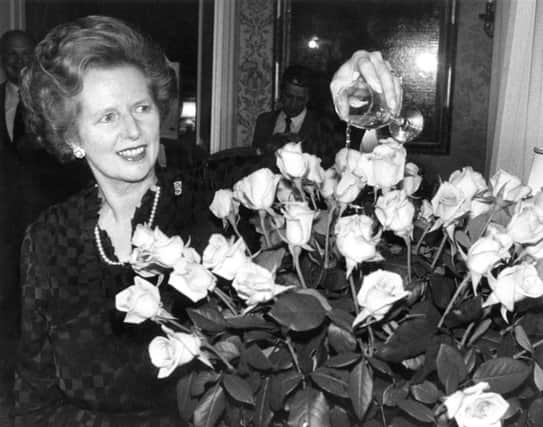Speech that was too tough for Margaret Thatcher


In a speech to the Conservatives’ back-bench 1922 Committee in July 1984, the then prime minister provoked outrage when she used that phrase to describe militant miners who resisted pit closures.
Her personal papers from that year – which contain the first handwritten draft of the “enemy within” speech – reveal she had no plans to back down.
Advertisement
Hide AdAdvertisement
Hide AdIn fact, a scribbled speech, released for the first time by the Margaret Thatcher Archive Trust, shows she planned to go further by launching a rare full-frontal attack on the Labour Party.
But it was torn up after the terrorist attack on the Grand Hotel in Brighton that killed five people at the start of the Conservative Party conference on 12 October, 1984.
However, it was taped back together by her own hand for posterity. Revealed for the first time, the speech begins: “From the dark cloud falls an acid rain that eats into liberty.”
Mrs Thatcher goes on to attack Labour’s support for the National Union of Mineworkers and unwillingness to condemn picket violence, saying: “The Labour Party in its present form, infiltrated by extremists, riven by factions, still stands upon the stage as the [principal] alternative to the Conservative Party in governing Britain.
“That, Mr chairman, is the measure of the shadow which has fallen across freedom since last we met.”
Chris Collins, from the Margaret Thatcher Foundation, is the only historian to have studied the papers to date.
He said Mrs Thatcher had been forced to soften her stance as a result of the national mood in the wake of the bombing – stepping back from a moment that would otherwise have helped define her career.
Mr Collins said: “It was a speech which would have been remembered as controversial and would have eclipsed ‘the enemy within’ speech – indeed, it was intended to do that.
Advertisement
Hide AdAdvertisement
Hide Ad“She would have taken some convincing to deliver such an attack on Labour and only done so within extreme provocation as such partisan politics were against her nature.
“But tragic events overtook her and, instead of a moment which would have been remembered for decades, the speech ended up torn up and later taped back together – probably by her own hand as she was a dab hand with Sellotape.”
The speech that was eventually delivered contained fragments of its predecessor but with virtually no references to the Labour Party.
Charles Moore, her authorised biographer, said: “The Thatcher archive is a marvellous resource. This release will provide the raw material to help researchers study and understand the changing political landscape of her first year as prime minister.”
The archive trust is steadily making Mrs Thatcher’s personal papers available to the public at the Churchill Archive Centre in Cambridge and online at www.margaretthatcher.org.
Prickly problem that saw tensions between Germany and Japan
IT MAY sound like a storyline from Yes Minister, but the naming of a rose proved a thorny issue for Margaret Thatcher.
The saga – which saw Britain acting as a middle-man while Germany and Japan bickered about the naming rights of a Margaret Thatcher rose – stretches over more than 40 pages in the former prime minister’s 1984 personal papers.
The diplomatic incident began innocently enough when she was approached by the German Central Horticultural Association asking permission to name a flower in her honour. She said she was “deeply touched by the honour”.
Advertisement
Hide AdAdvertisement
Hide AdHowever, she had forgotten that six years earlier she had granted permission for a Margaret Thatcher rose to be created by Japanese breeding company Takatori.
The story of the German rose made headlines and Mr Yoshiho Takatori wrote to the Prime Minister asserting his right to the name.
Amid threats of legal action, and after a series of memos, it was eventually decided the Japanese should be appeased. A response was sent, assuring Mr Takatori of the high regard in which his masterpiece was held. The matter was dropped, but not without having occupied hours of the PM’s time.